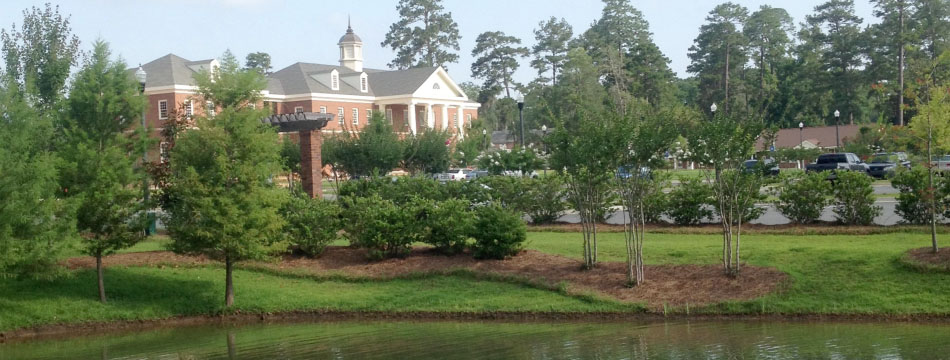[vc_row][vc_column width=”3/4″][vc_column_text]Gary Bonvillian, Ph.D., is president of Thomas University, located in the historic small town of Thomasville in Southern Georgia. We talked to Dr. Bonvillian about his decision to partner with National as a way to more cost effectively and proactively maintain a pristine campus environment.[/vc_column_text][/vc_column][vc_column width=”1/4″][vc_single_image image=”7034″ alignment=”center” style=”vc_box_shadow_border”][/vc_column][vc_column][vc_column_text p_margin_bottom=”20″ width=”1/1″ el_position=”first last”]What were your concerns before deciding to partner with National for your facilities management?
Bonvillian: The decision was a big one. We’d never outsourced any function of our operations before and we did think about a number of things—cost, as well as whether we would get good service, and the transition of our existing staff. We wanted our employees to adjust easily and benefit from the arrangement as much as we would.
One of the first things I do when I’m considering going into business with someone is to look at who else they’re successfully doing business with, and I’m influenced by that. When I see a good group of schools already working with a company and having a satisfactory experience, that factors into my decision, and that was the case with National.
How large a consideration was the financial aspect?
Bonvillian: Financial was of course a major consideration. I remember speaking with my chief financial officer and him asking, “This isn’t going to cost us more money, is it?” And no, it didn’t—if anything we’ve saved money. That part has definitely paid off for us, so much so that we’ve actually outsourced one other function since then and we continue to look for other opportunities.
How did the employee transition go?
Bonvillian: The transition went even more smoothly than I imagined. Our staff was brought on board by National, and many were even promoted and given higher levels of responsibility, often with more compensation, so in the end I think it’s benefited them even more than they expected. They’ve been treated exceptionally well by National, in my opinion.
Can you describe your partnership with National?
Bonvillian: Almost immediately, the National team felt to us as if they had always been here, they melded in very quickly. It felt perfectly natural, and almost shockingly, the level of complaints about physical plant issues decreased significantly in a short period of time once National arrived. They’re very responsive and proactive.
Another big benefit is that National has relieved us of the human resource function for a good-sized portion of our staff, which freed up our resources.
Did you get much pushback on the idea of outsourcing your physical plant management?
Bonvillian: I don’t recall any faculty or staff questioning our decision. I did get some pushback from a few in the community, but that went away quickly once they saw how well we were doing. I think our partnership with National was widely accepted because we positioned it as a business decision, which it was. From a financial perspective, outsourcing is very favorable for us.
You and your team interact closely with National’s supervisor. How is that relationship?
Bonvillian: Our supervisor here is very proactive, and we’ve fallen into a great rhythm where he just knows what needs to happen and things get done. I can pick up the phone or send him a text any day of the week, any time of day, and I’ll get a response very quickly. That means a lot to me.
The entire National team, in fact, is very attentive when it comes to customer service. They’re polite, energetic, they want to please. I know much of that comes down from the supervisor, but I also believe it comes from a set of values, a cultural element, that migrates down from the company itself and permeates everything it does.
How much do you think the look of your campus factors into student acquisition and fundraising?
Bonvillian: The business of successfully running a small campus that’s tuition-driven is a significant challenge. We live or die on enrollment and the ability to attract external funds through fundraising. Physical appearance is a key factor in today’s marketing for colleges and universities. There’s a competitive edge in having a beautiful campus where students are comfortable with the surroundings. Similarly, donors want to give to organizations they feel are a good investment. You have to look the part of being a winning organization.
What advice might you give to other college leaders considering a similar partnership?
Bonvillian: I understand why they might have concerns about outsourcing a major function, especially in cases where a large number of employees are affected. We had those same concerns but discovered quickly that with National our worries were unfounded
You might think that with an outsource services provider, there would be a disconnect between them and the rest of the campus. That’s not the case—it’s amazing how seamless our relationship with National is. We may have a contract with them, but in terms of our daily operations, they’re just part of our family and team.
Thomas University is a not-for-profit, four-year co-educational university that serves the post-secondary educational needs of South Georgia and North Florida. It provides quality education through a dynamic learning environment, with caring faculty and staff that change the lives of students. Offering associate’s, bachelor’s and master’s degrees, Thomas University is dedicated to providing an educational experience that explores and develops each student’s full potential.[/vc_column_text][/vc_column][/vc_row]
